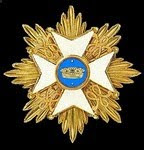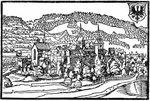I'm sure many of my readers will be aware that, when the Prussians invaded Silesia in an entirely piratical and unprovoked land-grab in 1740, Maria Theresa, who had just become Empress at 23, had neither the money nor time to reflag her army. Consequently her army went to war carrying the flags of her father Charles VI. We know the details of some of the flags but not all and a certain amount of informed speculation is needed when recreating them. The lack of standardisation is certainly colourful and attractive, and the same is true of the uniforms of the period, with coloured waistcoats and breeches, and musicians in varied and very colourful uniforms. From a military perspective, things like the lack of a standardised drill and artillery were not very helpful, though. In the eight years between the end of the War of the Austrian Succession in 1748 and the beginning of the Seven Years War in 1756 the Austrian army underwent a huge transformation, which made it a much more formidable foe to the Prussians; as the Prussian said ruefully after the battle of Lobositz in October 1756, these are not the same Austrians (that they had beaten time and again in the 1740s). From the wargamer's point of view, though, it is a pity that in the process much of the colour and variety were lost!
These are the flags of Austrian Infantry Regiment Deutschmeister as posibly carried in the 1740s. The Leibfahne is somewhat speculative but based on patterns carried by other Austrian regiments. Many Leibfahnen of this period do not seem to have had the Madonna on them, unlike later in the century, but were a simpler variation on the Kompaniefahnen.
A blow by blow account of the regiment can be found on Kronoskaf.
IR No.4 Deutschmeister: First raised 1695
C J Duffy in his book The Army of Maria Theresa (1977) says:
"Recruited in the Empire and especially the lands of the Teutonic Order. The Inhaber was the current head of the Order. A very famous regiment, distinguished at Camposanto, Rottofreno (1746), Kolin and Landeshut."
On its performance at Kolin: "Next in line to the west was Tresckow's corps which was repelled in fine style by the regiments of Deutschmeister, Baden and Botta."
In his more recent book By Force of Arms (2008) C J Duffy has a rather more critical account of the regiment. He says: "No.4 Deutschmeister. Proprietors: Wittelsbach, Clemens August, Prince, Elector of Cologne, as Grand Master (Hoch-und-Deutschmeister) of the Teutonic Order; succeeded as Grand Master in 1761 by Charles Alexander, Prince of Lorraine."
"Record: Distinguished at Kolin. Breslau, Leuthen. Stormed the Kirch-Berg at Landeshut. Otherwise of no particular reputation in the war [SYW, that is]. The crusading days of the Teutonic Order were long past, and the order was chiefly of value to the monarchy from its ability to recruit in its extensive lands in Swabia.
Significant losses: Very few prisoners or killed in action... Many deaths in hospital... and third heaviest desertion in the infantry."
He also says (which I cannot find specified anywhere else) that the regiment had black cuffs and lapels. All other sources suggest blue!
I suspect the more critical appraisal in the recent book reflects CJD's extensive new research in the Austrian archives; CJD himself says in the Foreword that rereading his own manuscript he was struck by how critical of the Austrian army it seemed, and that this probably is a consequence of the very warts and all completeness of the archives on the Austrian army, which speak well for the honesty and reliability of the material itself!
I plan to do more flags of this period soon...




















More excellent flags and a nice and easy uniforms to paint.
ReplyDeleteThanks for more fantastic flags.
Willz Harley.
David, Excellent as usual. My only concern is the shape - square. I certainly believe that square was the usual in the WSS (and these look very WSS) but I think rectangular might be more proper by the 1740s.
ReplyDeleteNigel
Cracking work once again David! Those are very eye catching flags and the 'blue flames' are really unusual, or they are to me at least. As always keep up the good work:)
ReplyDeleteThis Austrian WAS addition to your breadth of flags is a great step. Looking forward to seeing more.
ReplyDeletethank you!
Wonderful flags! And very eager to see more of these as you develop them.
ReplyDeleteBest Regards,
Stokes
a new little wonder
ReplyDeleteThanks
Ronald
Thanks, Willz. :-) I do like the Austrians...
ReplyDeleteAll the best,
David.
Thanks, Nigel. I suspect (in the absence of solid information; if anyone knows more I'd love to hear about it!) that late WSS flags like this from Charles VI's reign probably continued in use to much later in the reign, along with the more rectangular flags that, as you say, we identify as the later style. They may therefore have survived into the 1740s. There is such a paucity of information compared with the middle of the century that I am willing to use these earlier patterns or I would have very little to work with at all! We know of a few of the rectangular flags from Charles VI's reign but it is really a very small number. I do feel I have perhaps strayed into the Twilight Zone with embarking on these flags and I may live to regret it but...
ReplyDeleteAll the best,
David.
Thanks, Steve. :-) Moving so far back into the 18th century is undoubtedly venturing into much less certain territory but perhaps it's worth the risk as there are some very attractive designs, far from the less varied and standardised flags of the middle of the century onwards...
ReplyDeleteAll the best,
David.
Thanks, Jon. :-) I wish we had more information on the earlier period but we'll probably have to make do with what we do know - and if people do know more hopefully they'll tell me!
ReplyDeleteAll the best,
David.
Thanks, Stokes. :-) Adding Austrians to the current mix of French and Prussians and others as the spirit moves me, is possibly a bit crazy but hopefully I'll be able to juggle all this! We'll see...
ReplyDeleteAll the best,
David.
Thanks, Ronald. :-) More to come soon, I hope...
ReplyDeleteAll the best,
David.
Brilliant looking flags David!
ReplyDeleteThanks, Ray. :-) I wish we knew more about the flags carried in the early WAS; the SYW is a doddle by comparison...
ReplyDeleteAll the best,
David.
I loved these flags when I saw them fist on a nother homepage. But your work on them is excellent and I will certainly use them when I would repair paint on my flag bearers. Impressive!
ReplyDeleteThank you very much, André. :-) I'll be sorry when my sources run out on these 1740s Austrian flags; so much more diverse and interesting than the later types. I look forward to seeing some of them with your troops at some point!
ReplyDeleteAll the best,
David.